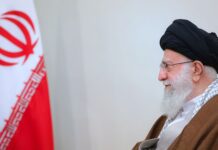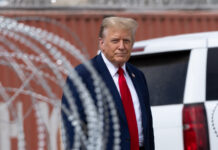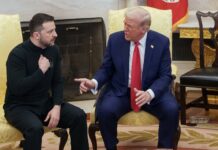Foreign policy has been one of the most notable and controversial elements of Donald Trump’s second term. The US President has launched a trade war with pretty much the entire world, as well as needlessly attack many of America’s closest allies, all within the first few months of his administration. However, when it comes to the US President’s foreign policy towards Africa, it is difficult to characterise it as nothing more than disdain coupled with a general lack of respect for African nations or their governments.
In the first few months of US President Donald Trump’s second term, we have seen his administration: place blanket travel bans on Africans from entering the United States, abruptly cut off vital humanitarian aid towards African nations, impose massive economic tariffs on African nations, deport non-Africans to African nations in an attempt at outsourcing Trump’s mass deportation agenda, spread falsehoods about a genocide in South Africa, and an attempt to embarrass South Africa’s president in the Oval Office.
From pretty much the first day the US President would take office his foreign policy would become the subject of much controversy; however, much of the international media has mainly focused on Trump’s attack on many of America’s allies as well as his trade war with China. What hasn’t always been the subject of much coverage are the extraordinary actions taken by the Trump administration directed at African nations.
One such action has been on economic tariffs targeted at African nations. In April, Trump decided to launch a trade war against the entire world with his “Liberation Day” tariffs. For decades, Donald Trump has had the belief that every nation around the world has essentially been taking advantage of the United States economically. This time around, in his second administration, Trump made the decision to go on the offensive and impose tariffs on nations worldwide, marking what he dubbed “Liberation Day.”
In international media, much had been made of the tariffs imposed on the European Union and China, as well as other Asian nations such as Taiwan, Vietnam, South Korea, etc. What hadn’t always been highlighted is the fact that some of the highest tariffs imposed by Trump on “Liberation Day” have been on African nations. For example, a 50% tariff had been put in place on the Kingdom of Lesotho, a 47% tariff on Madagascar, 40% on Mauritius and 37% on Botswana. Africa’s biggest economies would not be spared either; South Africa would be hit with a 30% tariff and Nigeria would receive a 14% tariff.

The rationale given by the US President for this trade war is that America is being ripped off by other countries around the world. So it was necessary for a national emergency to be declared in the US, in order for Trump’s tariff agenda to be put in place. Another strange rationale Trump has put forward for his tariffs is the trade deficits that the United States has with other nations around the world. Trump wants to eliminate the trade deficits the United States has with other countries by making them buy more American-made goods and is using tariffs as a negotiating tool.
Trump has sought to define his Liberation Day tariffs as being reciprocal tariffs on nations around the world. However, in reality that is not true at all. In reality, the US President calculated the tariffs by taking the existing tariffs imposed on U.S. products and adding the value of the national trade deficit with each country. The resulting figure was then used to determine the tariff rates applied on certain countries as part of the “Liberation Day” tariffs. So it is not very accurate to call those reciprocal tariffs.
Even with that in mind, it is difficult to imagine how that rationale applies to African countries supposedly taking advantage of the United States. Especially when you consider that many of our nations’ economies are dwarfed in comparison to even some of the poorest states in the US. How exactly is the Lesotho – a poor landlocked country located inside of South Africa – supposedly taking advantage of the United States? If you were to take out the enormous 125% tariff placed on China on “Liberation Day,” Lesotho would have been the country hardest hit by Trump’s tariffs, which absolutely boggles the mind.
If trade deficits are going to be the barometer by which the United States would place tariffs on other countries, then African nations would always be harshly highly tariffed. Many of our economies are too small and many of our currencies are too weak compared to the US Dollar for us to be able to purchase large amounts of goods produced in America even with free trade agreements. So such a policy would essentially mean that the United States is effectively turning its back on maintaining any kind of positive trading relations with Africa.
Then there is Donald Trump’s mass deportation agenda. The most blatant example of the Trump administration’s disdain for Africa would come in April, when US Secretary of State Marco Rubio announced that the US would abrubtly revoke all visas of South Sudanese passport holders. What would cause such drastic action? Marco Rubio accused the transitional government in South Sudan of failing to accept deportees “in a timely manner.” As a result, all South Sudanese visa holders would pay the price collectively.
I am taking actions to revoke all visas held by South Sudanese passport holders and to restrict any further issuance to prevent entry into the United States, effective immediately, due to the failure of South Sudan's transitional government to accept the return of its repatriated…
— Secretary Marco Rubio (@SecRubio) April 5, 2025
This was a completely outrageous move by the Trump administration. The idea that all South Sudanese nationals in the United States should be punished and potentially deported because of the actions of their government is simply ridiculous. If we are being honest, the likelihood of such action being taken against any other country outside of Africa is extremely improbable. It is difficult to imagine the US government doing anything similar to European or South American nationals. South Sudan is – at the end of the day – a poor, war-torn nation, so the Trump administration likely feels it can just kick it around easily.
And yet just in the following month of May, the Trump administration would deport 8 migrants to South Sudan, who are not even from the African continent to begin with. This follows the trend of the Trump administration attempting to use third-party nations in its mass deportation agenda. Another such African nation that has been attempted to be used by the Trump administration is Libya, notably against the wishes of the Libyan government.
The fact that the Trump administration sees no problem sending migrants to Libya and South Sudan tells you all you need to know about the inhumane nature in which the Trump administration is pursuing its mass deportation agenda. Two war torn nations – already struggling to support their own current populations – that absolutely should not be accepting US migrants. And the fact that the Trump administration was reportedly planing to deport migrants to Libya without the full consent of the Libyan government shows you just how much respect they have for African governments.
Then you have the issue of humanitarian aid. For decades, the United States has been providing vital humanitarian aid to African nations, which likely millions around the continent have become dependent on through the United States Agency for International Development (USAID). However, the Trump administration has been working to abruptly completely eliminate all the aid that the US had been giving out all over the world to impoverished communities.
Now, USAID has been the subject of much debate and controversy over the last few months about some of its operations. It has faced multiple accusations of corruption and accusations that the agency had been used as a tool for foreign interference in countries around the world. All of which should obviously be credibly investigated. However, it is also true that the agency has been involved in vital humanitarian work that affects the lives of millions of people across Africa and the world. Some of the vital initiatives USAID has been involved in are things such as combating starvation and the spread of diseases like HIV.
The sudden pause in the delivery of aid and the shutting down of the agency by the Trump administration has naturally had a major effect on the delivery of such aid around the African continent. There are of course Africans who argue that the shutting down of USAID is a good thing. They would typically claim that Africa needs to stop being dependent of foreign aid anyway, so they would cheer on the shutting down of USAID.
Naturally, most Africans would agree that it is crucial that African nations end our reliance on foreign aid. However, that doesn’t change the fact that abruptly ending an aid program that likely millions of impoverished people have become dependent on is a cruel action, which may likely have even led to the deaths of people. Yes, it is the prerogative of American voters and taxpayers to decide how they wish to see their tax money being used, so if they decide they no longer wish for their government to give out aid, that is their right.
However, there is a humane way to go about ending a foreign aid program that people are dependent on. That would typically involve gradually reducing the amount of aid given out overtime until it finally comes it an end. Only if you truly did not care at all for the types of people dependent on the aid provided, would you abruptly end it all in one swoop, as had been done by members of the Trump administration.
Then you have the Trump travel bans that had been put in place by this month by the Trump administration. In the list of 11 countries the US has placed a travel ban on, 7 African nations are included, such as: Chad, Congo Republic, Equatorial Guinea, Eritrea, Libya, Somalia and Sudan. A further 3 African nations would also have their nationals’ travel to the United States restricted, including Burundi, Sierra Leone and Togo. This week, another memo has been leaked of an additional list of countries that could be added to the list of travel banned nations, which includes (unsurprisingly) many more African nations.

If you look at the graph below, in fact, you would see that when added all together, it is nearly every single African country the Trump administration is looking to either ban completely or place restrictions on their nationals’ ability to travel to the United States. With this move, the Trump administration is sending a very clear message that they really do not want Africans to be able to travel to the United States at all.

Actually, there is one type of African that the Trump administration would like to see travel to the United States, and that is white South Africans. Despite Trump effectively stopping the US from taking in any refugees attempting to enter the US, there would be an exception made for white Boers from South Africa. Members of the Trump administration have also begun spreading easily disprovable falsehoods about a supposed genocide taking place against white South Africans.
All of this would culminate in the fiasco of a meeting that took place between Cyril Ramaphosa and Donald Trump at the Oval Office in April. This meeting will likely go down as one of the most disrespectful and disgraceful meetings between two heads of state broadcast publicly for the entire world to see. The US president would continue to spread falsehoods about the fictional genocide he believes is taking place in South Africa in front of the South African president. Trump would even have a number of videos and printouts of news articles he had prepared beforehand to display to the media pool.
The fact that the Donald Trump would plan to ambush President Cyril Ramaphosa in such a public manner tells you all you need to know about how much respect Donald Trump has for African Heads of State. Bear in mind, South Africa is among Africa’s largest economies and most industrialised nations, and this is how Trump treats the South African President. Now imagine what kind of treatment other African heads of state from much less developed nations can expect from the US President.
In order for two nations to establish and maintain good relations, there has to be a level of mutual respect held between both parties. And based on the actions of the Trump administration towards the Africa in its first few months in power, it is clear to anyone watching that they do not have any respect for Africans or our governments.












